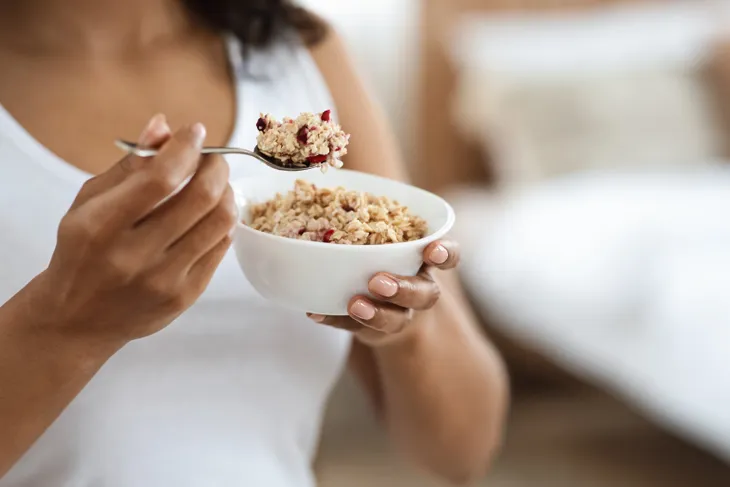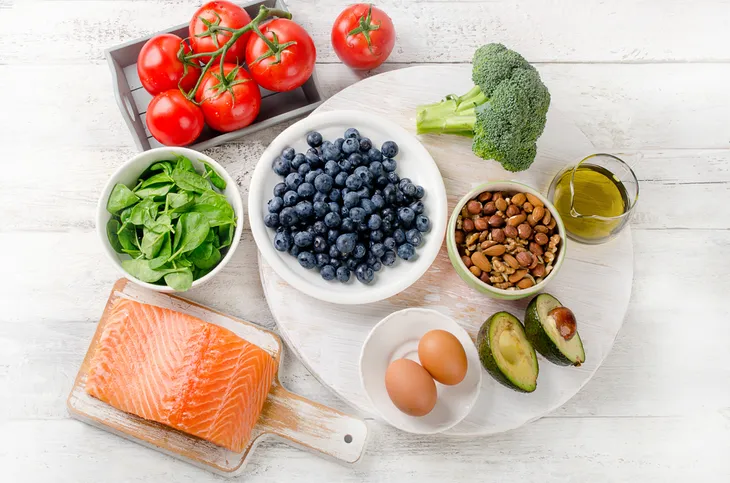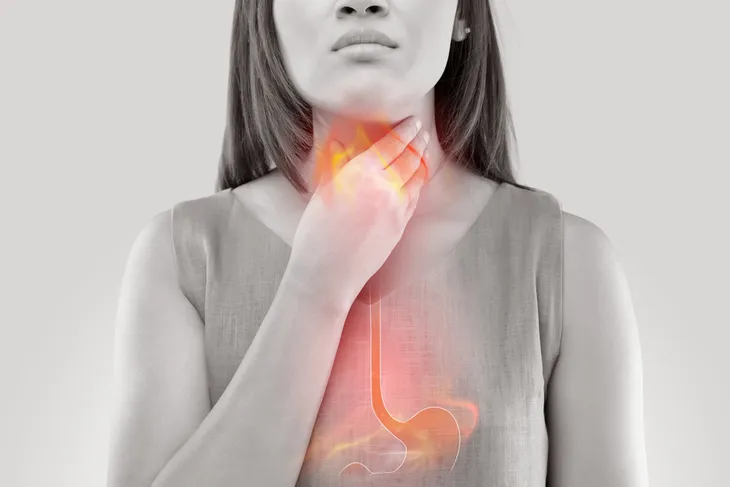- The majority of people tend to eat fast, but there are many health benefits to chewing and eating slowly.
- Eating slowly helps to prevent overeating by allowing your brain enough time to receive fullness signals.
- Some tips to eat more slowly include setting a timer, drinking water in between bites, and chewing more mindfully, among others.
It’s common to put careful thought and energy into selecting healthy ingredients, but many people overlook the actual process of eating food and how it affects our health. The majority of people tend to eat too quickly and without thoroughly chewing their food, which can cause a variety of negative health implications, including gaining weight.
Taking the time to thoroughly chew your food can increase your fullness hormones, improve digestion, and reduce the risk of heart disease, among other benefits. Follow along as we take a deep dive into all the benefits of eating slowly, and some tips to help you eat slower in the future.
The Value of Eating Slowly
Most people tend to eat their food quickly and without much thought. Studies have shown, however, that there are many health benefits to eating slowly. Learning to eat more slowly can be a powerful tool to aid digestion, weight loss, hydration, stress and many other factors.
Healthline explains that one recent review of 23 studies found that fast eaters were approximately twice as likely to be obese when compared to slow eaters. WebMD explains that most Americans eat too fast, which means they often take in too many calories before they realize they’ve eaten enough. Follow along as we take a closer look at all the health benefits of slowing down as you eat.
Increases Fullness Hormones
It’s common that eating too quickly can lead to overeating since your brain does not have enough time to receive fullness signals, according to Healthline. Your appetite and calorie intake is largely controlled by hormones that signal to your brain that you have eaten and that you feel full. This process takes about 20-minutes to complete, which means that eating slower gives your brain time to realize that you are full.
Eating slowly has been proven to decrease the amount of food consumed in one sitting due to this fullness hormone. Recent research presented at a meeting of the North American Association for the Study of Obesity showed that overweight men and women took in fewer calories when they slowed their normal eating pace.
 Shutterstock/NDAB Creativity
Shutterstock/NDAB CreativityImproves Hydration
It’s important to stay hydrated for many aspects of your health. Hydration helps to maintain the balance of fluid in our bodies, energize muscles, helps our kidneys and bowels work effectively, and can improve the appearance of your skin, according to Precision Nutrition.
Eating slowly has also been proven to increase water consumption during meals. A study at the University of Rhode Island compared the amount of water that the participants drank while eating. When they ate slowly, the participants drank about 14 oz of water, however when they ate quickly, they drank only 9.7 oz of water.
Promotes Thorough Chewing
Thorough chewing is important to aid digestion and reduce calorie intake. Several studies have shown that those who are overweight tend to chew their food less than those at a normal weight. The average calorie intake decreased nearly 15% when they chewed twice as much as usual.
Digestion begins in the mouth, so it’s important to adequately chew your food to help your stomach turn your food into chyme. Chewing too quickly can lead to indigestion and other potential GI problems, so it’s important to be mindful as you eat your meals and chew slowly.
 Shutterstock/Bobex-73
Shutterstock/Bobex-73Improves Digestion
Eating slowly helps to improve overall digestion, which goes hand-in-hand with through chewing. Precision Nutrition explains that digestion is a chain reaction that begins when we see, smell or think about food. This causes us to begin salivating which helps to break down food in the mouth. In the following steps, our stomach secretes acid and the small intestine prepares for peristalsis.
If we rush the process of eating, it forces our GI tract to digest before it is fully prepared, causing digestive issues. WebMD explains that one of the best ways to improve digestion is to eat your food more slowly to make the process easier on your system.
Increases Enjoyment of Food
Eating slowly can also increase your enjoyment of the food and help you feel more satisfied. Precision Nutrition explains that eating slowly helps you to savor a meal and truly pay attention to the tastes and textures. Eating slowly is a form of mindful eating that leaves you leaving the table feeling satisfied and happy.
Eating slowly and enjoying every bite makes the dining experience enjoyable and an event to look forward to. You could even consider elevating the experience further by lighting a candle, playing some music, turning off any distractions, and focussing on the present moment as you enjoy your meal.
 Shutterstock/Drazen Zigic
Shutterstock/Drazen ZigicImproves Absorption Of Nutrients
Since eating slowly aids digestion, it also gives your body time to properly absorb nutrients. Chewing allows your body to break down food into smaller pieces to make them easier to digest. Experts suggest, according to Healthline, to chew your food 32-times to properly digest.
When you aren’t rushing your body through the digestion process, it allows the greatest possible amount of nutrients to be absorbed from the food you eat. Nutrients from food are absorbed in the small intestine, so it’s important to ensure the food is thoroughly broken down by this point.
Reduces Risk of GERD and Heartburn
If you struggle with heartburn, eating slower may be your solution. WebMD explains that fast eating can increase the risk of acid reflux after meals. Gastroesophageal Reflux Disease (GERD) occurs when stomach acid washes up into the esophagus and causes chest pain and heartburn.
A new study has revealed that those who eat quickly experienced a total of 15 GERD episodes in comparison to 11.5 GERD episodes triggered by the more leisurely meal. It was also reported that acid reflux episodes were reported 12.5 times more after a five-minute meal in comparison to 8.5 times after a 30-minute meal.
Reduces Risk of Heart Disease
Another major benefit to eating slowly is that it may help to prevent cardiovascular disease, according to Medical News Today. Cardiovascular risks are associated with those that have increased belly fat. Eating too quickly can cause you to overeat, which can lead to fat build up around the waistline and an increased risk of heart disease.
Simply taking more time to eat and chew your food thoroughly can help you lose belly fat and also reduce the risk of developing heart disease. It can also help prevent cardiovascular risk factors such as high cholesterol, high blood pressure, obesity, and diabetes.
Reduces Stress Levels
It’s common to reach for comfort food when we are stressed, rather than when we are actually hungry. This can lead to overeating and eating unnecessarily as a coping tool to deal with stress. This can also lead to fast-eating since you are reaching for food out of comfort rather than for true hunger.
Emotional eating can add to your calorie intake and cause weight loss, especially if it becomes a habit when you’re stressed. If you learn to eat slowly and intentionally, it can turn eating into an enjoyable, savored experience rather than one that remedies stress.
 Shutterstock/fizkes
Shutterstock/fizkesRegulates Appetite
Eating slowly can help you get a better grasp on your appetite and help you determine when you truly are hungry. When you eat too quickly without chewing thoroughly, it can result in overeating and acquiring a calorie surplus.
Medical News Today explains that eating slowly and more mindfully can help you regulate your appetite naturally. It’s easier to understand what your body needs when you are paying attention to the pace you are eating and when you feel truly full.
 Shutterstock/Joshua Resnick
Shutterstock/Joshua ResnickTips to Eat Slower
Eating slower clearly has a long list of benefits for your health, but sometimes it’s easier said than done. Luckily there are a few tips and tricks available that can help you start eating slower and more mindfully. One way to prevent fast eating is to avoid extreme hunger and always keep snacks on hand. You could also put in a conscious effort to chew your food more, or set your utensils down between bites to ensure you’re savoring your meal.
You could consider drinking water between each bite, or setting a timer for 20-minutes and trying your best to not finish before the timer goes off. The key to slow eating is to be patient and mindful. Try taking a few deep breaths or turning off your screens during dinner to avoid distractions and focus on your meal.
 Shutterstock/astarot
Shutterstock/astarot








